 MyCatBreeds
MyCatBreeds Sokoke is originated from Kenya but British Shorthair is originated from United Kingdom. Both Sokoke and British Shorthair are having almost same weight. Sokoke may live 4 years less than British Shorthair. Both Sokoke and British Shorthair has same litter size. Both Sokoke and British Shorthair requires Low maintenance.
Sokoke is originated from Kenya but British Shorthair is originated from United Kingdom. Both Sokoke and British Shorthair are having almost same weight. Sokoke may live 4 years less than British Shorthair. Both Sokoke and British Shorthair has same litter size. Both Sokoke and British Shorthair requires Low maintenance.
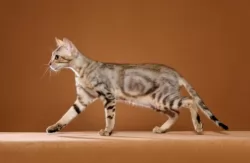 Compared to other breeds of cat, the rare Sokoke Forest Cat is a fairly new natural breed. It comes from the Sokoke district of eastern Kenya but was developed in the USA.
Compared to other breeds of cat, the rare Sokoke Forest Cat is a fairly new natural breed. It comes from the Sokoke district of eastern Kenya but was developed in the USA.
It is in fact, named after the Arabuko Sokoke National Forest, from where the wild foundation stock came from. Wildlife artist Jeni Slater started breeding these cats in the 1970s. They eventually reached Denmark, where further breeding continued, with the cat becoming popular with local cat fanciers, and laid the foundation of the breed in Europe.
Today, there are just a few breeders registered in the UK and TICA, The International Cat Association lists the Sokoke cat as a New Preliminary Race and it was recognized by FIFe in 1993.
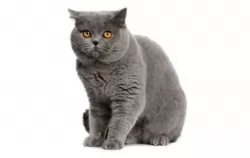 A cat breeder, Harrison Wier took a street cat of Britain and with an intensive breeding program, transformed it to the British Shorthair.
A cat breeder, Harrison Wier took a street cat of Britain and with an intensive breeding program, transformed it to the British Shorthair.
The British loved this beautiful pedigree cat. During the Second World War, the British Shorthair all but disappeared but re-emerged as a popular cat that is today accepted in cat registries around the world.
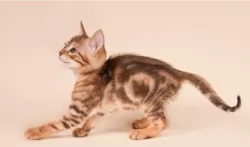 The Sokoke is a medium-sized cat with a long, lean body and slender legs. The hind legs are somewhat longer than the front legs. The head is smallish and round and he has a constantly alert look to him.
The Sokoke is a medium-sized cat with a long, lean body and slender legs. The hind legs are somewhat longer than the front legs. The head is smallish and round and he has a constantly alert look to him.
A striking characteristic of the Sokoke cat is its tabby fur, which people say looks like the bark of a tree and it is brindle in coloring.
The tail is medium to long and the ears are also fairly large, The eyes are large and almond-shaped and can be greenish to brown. The coat is short and coarse.
Cat lovers enjoy these playful, curious, intelligent, and family-orientated cats. In spite of their wild side, they adapt easily into different homes.
They’re inquisitive and will follow you, much like a dog. They will even enjoy a leash being put on them and being taken for a walk. They’re very sociable and vocal too and get on with everyone, children and other pets included.
They’re playful cats, loving to jump and climb and then look down at you from their high perches. Easily bored, you will need to provide fun and games continuously.
They enjoy being involved with everything you’re doing and form a strong bond with their owners. Because the Sokoke is social and affectionate, they require quite a lot of attention, and if they don’t get the attention they crave, they meow in anxiety.
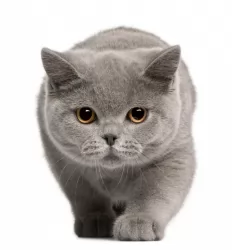 The British Shorthair is a medium to large-sized cat and he can be anything from 5 to 9kg. He has a short to medium-length dense coat that can either be a solid color, bi-color tortoiseshell or patterned.
The British Shorthair is a medium to large-sized cat and he can be anything from 5 to 9kg. He has a short to medium-length dense coat that can either be a solid color, bi-color tortoiseshell or patterned.
The coat becomes thicker and longer in the winter. This is a robust, strong cat, being heavily muscled with heavy bones. The cat also has a broad chest with thick, strong legs. The ears are fairly small and the round eyes give him a totally amicable expression on his face.
The British Shorthair is an amicable cat and makes a superb companion as it's an easy-going cat that adores his human family, being loyal towards them.
The British Shorthair is an active cat and it is able to get by on his own for a few hours without human company. If you do work particularly long hours and you go out a lot, it will be kind to perhaps get another cat for him as a friend.
He is quiet and undemanding and because he is big and heavy he doesn’t like being carried around.
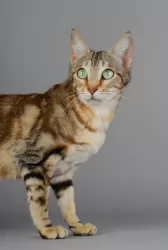 Your Sokoke is a very social cat and he will get on particularly well in a home with children who have been taught to be kind and gentle with animals.
Your Sokoke is a very social cat and he will get on particularly well in a home with children who have been taught to be kind and gentle with animals.
They are able to adapt well to homes where there are other pets too. They just love exercise and lots of fun. They don’t like being in a home where the owner is out at work all day. The solution to this is to provide him with another cat as a companion.
Sokoke cats are great with people of all ages, and when you bring one of these lively cats into your home, make sure he also receives his share of love and companionship.
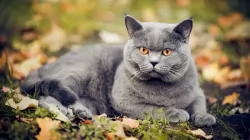 The British Shorthair is such a companionable cat, being intelligent and affectionate, even though he isn’t a lapcat as such.
The British Shorthair is such a companionable cat, being intelligent and affectionate, even though he isn’t a lapcat as such.
That doesn’t mean he doesn’t love being around his human companions. He does and is loyal to them.
They’re laid back cats and are capable of getting on well with children in the home as well as with other pets. He just loves lazing around in the sun and can spend a few hours on his own without feeling anxious or lonely.
These cats are really great companions and they make themselves at home in different lifestyles, whether you live in the countryside or in town and whether you are single, a couple or a family with children and other pets.
Easy to care for, the British Shorthair cat is guaranteed to make you an excellent companion.
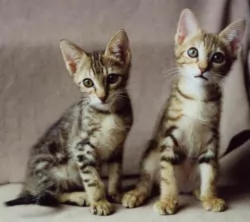 Sokoke cats are generally healthy and have no inherited diseases. To ensure that your Sokoke stands a chance of having a healthy life, you need to have him vaccinated against the life-threatening cat diseases there are.
Sokoke cats are generally healthy and have no inherited diseases. To ensure that your Sokoke stands a chance of having a healthy life, you need to have him vaccinated against the life-threatening cat diseases there are.
If your Sokoe cat isn’t his usual self day after day, make a point of getting him to the vet just as soon as possible.
Parasites are a terrible scourge with cats, and in fact, the number one cause of hair loss in cats is fleas. The bite of a flea can cause an allergic reaction. Your cat can become miserable with continuous biting, itching, and scratching and this can all lead to hair loss.
It is a wise move to speak to your vet about a good product to treat your furry friend with.
There can actually be many causes of diarrhea in cats and one of them is parasites, but it can also be caused by a viral infection or food allergy or something else.
You want to get your cat to the vet who can help you bring it under control. You may also have to feed your cat a bland kind of diet to help the cat’s digestive tract recover from the diarrhea.
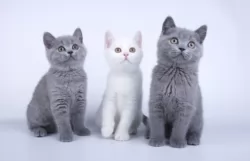 These beautiful cats are a robust, healthy type of cat breed and if you care well for him, you aren’t going to be taking him along to the vet too often. He can also live to be up to 20 years of age.
These beautiful cats are a robust, healthy type of cat breed and if you care well for him, you aren’t going to be taking him along to the vet too often. He can also live to be up to 20 years of age.
This cat has been bred with Persians in the past, so this should alert you to some of the diseases that this particular cat breed is susceptible to. It makes the cat a little bit vulnerable to polycystic kidney, an inherited condition in cats that causes cysts to form in the kidneys. They are small at first but they can grow bigger and actually result in kidney failure.
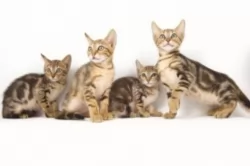 Because the Sokoke’s coat is short and close-lying, with little or no undercoat, brushing once a week will be sufficient.
Because the Sokoke’s coat is short and close-lying, with little or no undercoat, brushing once a week will be sufficient.
The Sokoke cat is very energetic, and he will need games, toys, and attention to keep him physically and mentally stimulated. They love climbing so a climbing tree and other kind of equipment will be a good idea.
Provide your cat with a litter box and ensure it is kept scrupulously clean by removing the cat’s feces every single day.
Diet is of critical importance to the health and happiness of a cat. Some people try to feed their cats human foods and wonder why their cat is continuously sick. A cat is a carnivore and he requires meat.
You can speak to your vet about the best kind of commercial cat food there is for your cat. Read the label and feed him portion-sizes as directed.
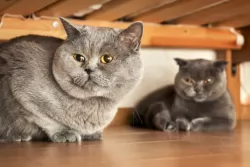 The British Shorthair is a fairly large, robust cat but that certainly doesn’t mean he must be fat. Being overweight can bring about a range of health issues and you want to follow an appropriate diet for him ad see that he gets enough exercise.
The British Shorthair is a fairly large, robust cat but that certainly doesn’t mean he must be fat. Being overweight can bring about a range of health issues and you want to follow an appropriate diet for him ad see that he gets enough exercise.
When it comes to feeding your British Shorthair, always look out for the very best, most nutritious food there is as he is a big cat.
You want to ensure your pet gets enough protein as cats are carnivores - they’re meat eaters and they require chicken, beef and fish. You can give your cat some cooked egg as they are an excellent source of protein.
Be very careful not to be tempted to give your cat chocolates, grapes, nuts, onions or garlic as foods like this are toxic for your cat and can cause him pain and discomfort.
Remember to ensure that there is always a constant supply of fresh, cool water for your cat. If you’re wondering what to feed your cat or you have any other concerns, don’t hesitate to speak to your vet.
Brush your British Shorthair when he starts to shed his winter coat and trim the nails.
Do things for your cat that you would do for your own human child. This is your beloved fur-child and you want him to be happy and healthy.
Check inside his mouth to make sure there aren’t any loose or blackened teeth that could be causing him terrible pain. Also, check inside his ears for signs of redness.
Your British Shorthair is an elegant, clean type of cat so you want to keep his litterbox nice and clean for him.